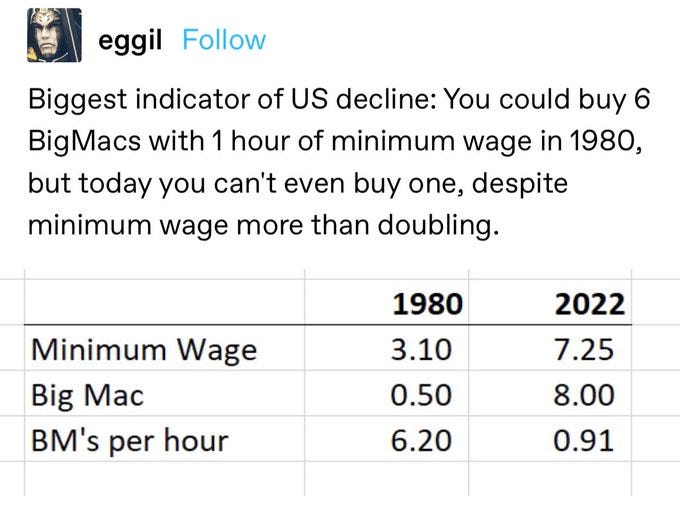New Escapologist : December 2022
A Well Oiled Machine
Hello there. This is New Escapologist, a newsletter from the famously cheerful magazine and blog for people with escape on the brain.
If all’s gone according to plan, you’re receiving this monthly newsletter through Substack. If you’ve not seen anything from us in a while, it’s probably because our newsletters have been going to spam. This was a recurring problem with our old newsletter provider, one which has hopefully been remedied now. If you’re one of those people: welcome back. If you’re not one of those people: welcome anyway.
The big news is that we want to bring back the magazine next year, so these newsletters are a way to tickle your escape valve in the meantime. I’ll send out a survey soon to catch your ideas about what you’d like to see in a new print mag, but feel free to comment through Substack for now or email me or comment beneath this blog post. Comments are also welcome concerning Substack itself.
But that’s enough housekeeping from me. From this point on, you’ll find us a well oiled machine. On with the shoe. Um, show.
Robert Wringham
New Escapologist
A uniquely Ryan-shaped escape hatch
I’ve been listening to This American Life. I must just dig vocal fry.
The “Who is Ryan Long?” episode tells the escape story of a game show contestant called, well, Ryan Long. He did extremely well on TV’s Jeopardy!, winning almost $300,000.
Ryan was introduced to the telly-viewing public as as a rideshare driver but he’d actually been something of a factotum. Throughout his thirties, he’d worked in airport security, as a package handler, an office clerk, a piano mover, in warehouses, as a “water ice guy”, a cashier, a bouncer, and a street sweeper. As he puts it, “You got to do what you got to do, right?”
Ryan is biracial and physically large, which apparently isn’t the typical profile of a Jeopardy! contestant. His confounding of prejudice is the thrust of this programme about him, but the presenter goes on to say:
I also got this accidental reflection on American capitalism, and how so many of us are served so poorly by the way life is currently set up as all work and no time. Jeopardy provided a very specific Ryan-shaped escape hatch. It gave him the space to stare into that crack between realities, and fish out all the elements of what his life could be.
We’re all too often told that work is liberating, that it’s what we have to do to “get ahead” but the rewards are often so low (increasingly so - see the “Big Mac Index” story below) that all we get in exchange for our graft is the basic home-and-healthcare package if we’re lucky. We do not generally find the time for personal improvement or to give anything worthwhile to our communities beyond the immediate demands of capitalism.
This “accidental reflection” came about when the interviewer asked Ryan if the prize money had made him happy.
It [gave] me the opportunity to have time to […] examine myself, I guess. Just everything before, looking where I come from and what makes me tick. It’s a valuable thing. I think everybody needs to do it, but not everybody has time to do it. […] That’s the most valuable thing that I got out of this.
It’s an example of how a life-changing sum of money (though still not the millions some people imagine they’d need to retire) led to the buying of time to do the personal work, to take stock, defrag, and see what’s going on with yourself.
I wish more people had the chance of this kind of reflection, for mental good health and for figuring out what to do next. Instead we’re shoved around with none of the naturally-occurring time of our lives to spare. We’re told that Universal Basic Income, for example, would lead to unproductive and immoral slacking but Ryan, this clever everyman, joins a growing body of people who show otherwise. What would you do with a $300,000 escape fund?
The Big Mac Index
I’ve often wondered if the early- to mid-Twentieth Century wasn’t the best possible time to be alive despite the effect of the Wars.
As well as being aesthetically superior to our own cheapo resource-poor moment, you really could live well with less.
Anecdotally, I think of my grandparents whose homespun “waste not want not” philosophy allowed them to shun professional labour for about fifty years. I write about them a little in The Good Life for Wage Slaves, but both of my grandparents had easygoing pre-War jobs (rent collector, motorcycle engineer) when they were young. They both had War Effort jobs for three or four years and that was it pretty much it. They rented their little house with pension and odd job money, lived cheerful lives of unambitious pottering and occasional holidays in Tenby in Wales and were seemingly content, even happy.
There’s the story of a penniless Patti Smith (as told in Just Kids) finding fifty cents in Central Park. It was enough money for someone to painlessly lose but it was also enough for Patti to buy breakfast (at least $30 in today’s money) for herself and Robert Mapplethorpe.
And there are fictional accounts like the ones in It’s a Wonderful Life where the poor migrant Mancini family pay off their mortgage over four years, and The Secret Garden in which the money Mary Lennox would have spent on a child’s bucket and spade was enough to feed a family for (I think) a week.
So far so much anecdote. But apparently my suspicions are correct! The phenomenon is called Purchasing Power Decline and there’s something called the Big Mac Index to prove it.
Your basic wage slave of 1980 (the year of The Shining, The Blues Brothers, Raging Bull and The Empire Strikes Back) earned six Big Macs an hour. We, by comparison (in the year whose cultural productions you’ve never heard of and never will) don’t even earn one Big Mac.
The relationship between work and reward is broken. Depressing? Yes. But on the other hand, there’s never been a more cost-effective time (because you’re not losing anything worth having) to put your feet up. Take it easy, I say, and enjoy the spoils of the last century.
Four US States Vote to Ban Slavery… 159 Years After Abolition
Do you ever think about prison? I do. Not because I have plans to end up there, nor because I’m a great and empathetic guy. I’ve been watching Orange is the New Black is all, usually in the hours set aside for my important literary work.
It’s crazy that we send people to prison at all, let alone in such needlessly horrible conditions sometimes, but let’s talk about one specific element of prison before I end up on a poorly-informed high horse. A particular prison issue I’ve been thinking about turns out to be topical.
We probably all know from general osmosis that American prisoners are given grunt work to do. Printing car license plates is a classic, right? Sewing mail bags is another. But those particular tasks are probably pop-cultural cliches in 2022 and you just know there’s other jobs done by American inmates for peanuts or for no money at all.
That there might be some sort of sweatshop-adjacent scam going on in US and other prisons might have occurred to you before but I for one never quite grasped the significance of that thought, probably because I’m a selfish hipster idiot, or maybe because its just too dark and shameful to contemplate.
This is the news story I’m talking about:
SLAVERY WAS ON the ballot in five states on Tuesday, with four of them — Alabama, Tennessee, Vermont, and Oregon — approving constitutional amendments to abolish the use of involuntary labor as a form of punishment. The fifth, Louisiana, rejected the measure after the Democratic state lawmaker who proposed it wound up telling voters to oppose it over an issue with the wording on the ballot.
It turns out that there’s a loophole in the Thirteenth Amendment, the famous constitutional rule abolishing slavery in the US in 1864. Apparently it’s fine to make billions of dollars from “involuntary labor” if the workers have been imprisoned. Hmm.
It’s interesting that when we hear about slavery in the press, it’s usually about rogue individuals or in an historic context or in a country where human rights concerns already widely reported, and not about the two million people currently incarcerated in Free World slammers.
I won’t say anything more for now because I don’t know enough about the issues (I’ve just reserved two books on the subject at the library though!) and I am, of course, not an American. But, y’know, bloody hell.
If you have experience of prison, either directly or through family or friends, I’d quite like to hear about it. Drop me a message if you’re willing.
Giant Bug Monster
A human on Twitter mentions the “giant bug monster” from The X-Files “that pretends to be upper management at a call centre.” And they share a nice behind-the-scenes photograph.
I remember that guy! The episode you’re looking for is called Folie à Deux and it’s delightful. White collar grunts with a penchant for mild supernatural horror will love it.
Remembering. And Asking “What’s Next?”
Imagine if capitalism was just switched off one day. If the government just decided to admit that money isn’t real and the whole thing was being called off. Debts written off, no more payday, Absolute Jubilee. Landlords wouldn’t need to suck the life out of tenants any more because their own upholstered lives wouldn’t be dependent on wealth. Supermarkets wouldn’t charge anymore and could just become food distribution centres under the benign new management of community organisers. We could all escape our bullshit jobs and do nice things (valuable cultural things, important altruistic things) for no pay instead.
Obviously this will never ever happen and, if it did, all sorts of forgotten and ignored problems would scuttle out of the cracks. It was an idle fantasy I arrived at while thinking about… Twitter again. Sorry.
I don’t think Twitter is really going to disappear, though lots of people seem to. And if it does go, what will people do when they find that they’re finally free?
Freedom from social media as we know it could really be the consequence, I think. Twitter is probably the last of the true mega-platforms, isn’t it? TikTok has more users but it seems less infrastructurally important because, unlike Twitter, it’s just a bit of fun. Nobody’s pestering me to join TikTok and nobody thinks I’m eccentric or a Luddite for not being on it. Shops don’t tend to have TikTok emblems in their windows like they do for Facebook and Twitter. Nobody says “oh, you have to be on TikTok!” It doesn’t seem to have the “necessary evil” strongarm nudge power of Facebook and Twitter. With ease, you can ignore it.
It seems that, were Twitter to shut down or vanish behind a paywall, you could get away with having absolutely no social media in your life at all. Nobody would expect it.
So what will happen when the age of “necessary evil” social media, of Big Social to coin an obnoxious phrase, is over? To start with, journalists might have to re-learn some old tricks; to actually ask penetrating questions instead of scraping Twitter for secondhand hot takes.
Many will continue in their “pivot to video” by embracing TikTok and whatever comes (or has come, probably) after it. But it will be diminishing returns as these platforms become sillier and less essential.
Others will return to a period of Internet time before the algorithms took over: platforms called dreamwidth and cohost are being mentioned and they look just like Livejournal. That would be nice. I still believe that the Internet is not the problem, only that the mega-platforms are damaging free will.
And maybe we can regress en masse even further to pre-Internet ideas. I for one am hoping to set up a small publishing press (real paper!) with a friend next year. New Escapologist might be back in paper too. Move over bits, atoms are back!
The death of Twitter obviously wouldn’t be as big as the death of money but there would be a similar sense of walking out into freedom again (a freedom that was there all along, really), of squinting in the sunlight and feeling its warmth on your skin (but was it always so warm?), of remembering, and asking “what next?”
Letter to the Editor: I Hoarded Insulin Before Jumping Ship
Hello Robert,
As someone who decided to finally give up any pretense of work and to take up full-time idling just one month ago, I’d love it you brought back the magazine.
I worked full time for 43 years at various jobs including roadie, sound engineer, archaeologist, barman, and then 25 years as a web developer. I can safely say I came to hate all of my jobs after a short honeymoon period each time I changed careers.
It was by reading your books, and Tom Hodgkinson’s books and magazine, that made me realize that, with a bit of effort and luck, I could pack in work at last.
With my family’s support I did it last month and I have never been happier! We moved to the US ten years ago from Scotland. We currently have no health insurance, which is a worry for me as a diabetic. I hoarded insulin for ages before jumping ship and my wife will be eligible for coverage before Christmas so my only worry will be over soon.
Thank you for your books and magazine. They were very inspiring and I really do hope you relaunch the mag. I will be one of the first subscribers!
All the best,
Reader M, wintry Indiana
To send a letter to the editor, simply write in. You’ll get a reply and we’ll anonymise any blogged version.
Until Next Year…
A strangely American slant this month, no? Jeopardy!, Big Macs, the Thirteenth Amendment, The X-Files, wintry Indiana. Unsure as to why. I blame Ira Glass and his moreish radio show. We’ll turn our eyes back to my own island nation in January.
Anyway, Merry Decembermas, for all who partake! What is Chez Wringham’s non-festive movie is this year, you ask? Why, it’s Big Trouble in Little China.
That’s all for this issue. There could have been more, but it’s already too long, isn’t it? I hope you like the new newsletter format. Let me know: Substack allows for reader comments. You can also still email me in the good old-fashioned way.
This newsletter will always be free as a non-caged bird, but if you’re feeling supportive you could buy my book, The Good Life for Wage Slaves or sling me a derisory quid (thus making a de-facto contribution to the magazine print fund) through Ko-fi.
Ho-Ho-Ho! and Seasons Greetings,
Robert Wringham
www.newescapologist.co.uk






Prisons: It happens in UK too. There was a minor furore a few years ago about Wilkinsons using v cheap prison labour to pack boxes. Freedom (anarchist newspaper, now sadly defunct) covered it. Our Western lives simply cannot be sustained without slavery; either here, in far away countries (out of sight) or the fascinating concept of "energy slaves".